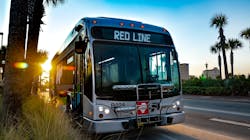JTA has $198 million impact on Jacksonville’s economy
The Jacksonville Transportation Authority’s (JTA) economic output exceeded $198.8 million in 2018, according to a study JTA commissioned the University of North Florida’s (UNF) Coggin College of Business to complete.
The study, “Economic Impact Study of Jacksonville Transportation Authority (JTA) Operations, 2018,” also concluded JTA services saved customers more than $23.4 million in transportation-related expenses.
The study was completed by Chung-Ping (Albert) Loh, Ph.D, a UNF professor of economics and director of the Local Economic Indicator Project at UNF’s Coggin College of Business. His work is based on figures from the 2018 fiscal year that concluded Oct. 1, 2018.
“JTA’s operations provide many benefits to the community and contributes directly to the local economy,” Loh wrote in the study.
Loh’s study measured the economic contribution of JTA’s operations to the five-county Jacksonville, Florida, Metropolitan Statistical Area (MSA), including output, employment, labor, compensation and tax payments. He also measured several economic benefits of JTA’s operations to JTA customers and other Jacksonville citizens.
The Jacksonville MSA comprises Baker, Clay, Duval, Nassau and St. Johns counties.
“It is clear that the JTA is making a positive economic impact on Jacksonville and our neighboring communities,” said JTA CEO Nathaniel Ford. Sr.“As our region continues to grow and prosper, the JTA will be here to help by expanding services and promoting transit-oriented development.”
Some of the highlights from the report include:
Labor
JTA’s employment roster generated $43.7 million in direct labor income for the area and $112.5 million in direct economic output.
Additionally, JTA’s operations are supported by other industries within the Jacksonville MSA, and their employees. This indirect impact represented more than $14.1 million in labor compensation and more than $37.3 million in indirect economic output.
The study found that labor earnings by JTA employees and those in related sectors also led to the consumption of more goods and services like groceries, entertainment and retail shopping. This induced impact, due to JTA’s operations, added $15.7 million in labor compensation and $48.8 million in economic output.
Combined, the JTA’s operations led to more than $73.6 million in labor compensation, $118.6 million in total added value and $198.8 million in economic output.
Savings for Customers
JTA customers rode a total of 64,332,545 miles in 2018, taking more than 12 million trips.
According to the study, if those customers traveled the same distance in their own vehicles, the cost of doing so would be significantly higher compared to using JTA services.
As a benchmark, Loh used data from a 2017 AAA study, “Your Driving Costs,” which calculated the annual expenses of owning, operating and maintaining a personal vehicle, based on driving 15,000 miles annually. The AAA data calculated expenses ranging between $6,354, $8,171 and $9,399, depending on the size of the vehicle.
“Based on the unweighted average of costs across these three vehicle types, the cost of operating a car per mile is 53 cents,” Loh wrote. “This implies that the total cost of traveling 64,332,545 miles would have amounted to $34,096,249 through passengers driving themselves.”
Compared with the $10.7 million JTA received in FY 2018 from passenger fares and passes, Loh concluded that customers saved more than $23.4 million by using JTA services instead of driving their own vehicle.
JTA also contributes to the economic success of historically disadvantaged communities.
Approximately 40.8 percent of JTA customers earn incomes under the poverty threshold. Of those customers, 32.5 percent hold full-time jobs and 27.5 percent hold part-time jobs and consider JTA their only feasible way to get to and from work.
Loh stated that “…JTA’s operations are associated with the economic benefit of improving access to work for economically disadvantaged populations,” and that the total benefit in economic disruption avoidance was $43.3 million.
Reducing Congestion
It’s also no surprise that when more people ride JTA, congestion on busy highways and roads decreases.
Loh utilized data reported in the 2017 and 2018 North Florida TPO Annual Mobility Reports, which indicate traffic delay, traffic congestion and traffic volume trended upward from 2010 to 2016.
Drivers spent an estimated 37,979 hours in traffic delays in 2016, according to the North Florida TPO. About 10.6 percent of their total driving time in 2016 was spent in severely congested traffic situations.
Loh found that about 18 percent of JTA customers surveyed in 2016 said they would’ve driven their own cars if not for JTA services. Based on that figure, and others, Loh concluded that without JTA services, those additional drivers would’ve increased traffic delays by 20.84 vehicle hours per day.



